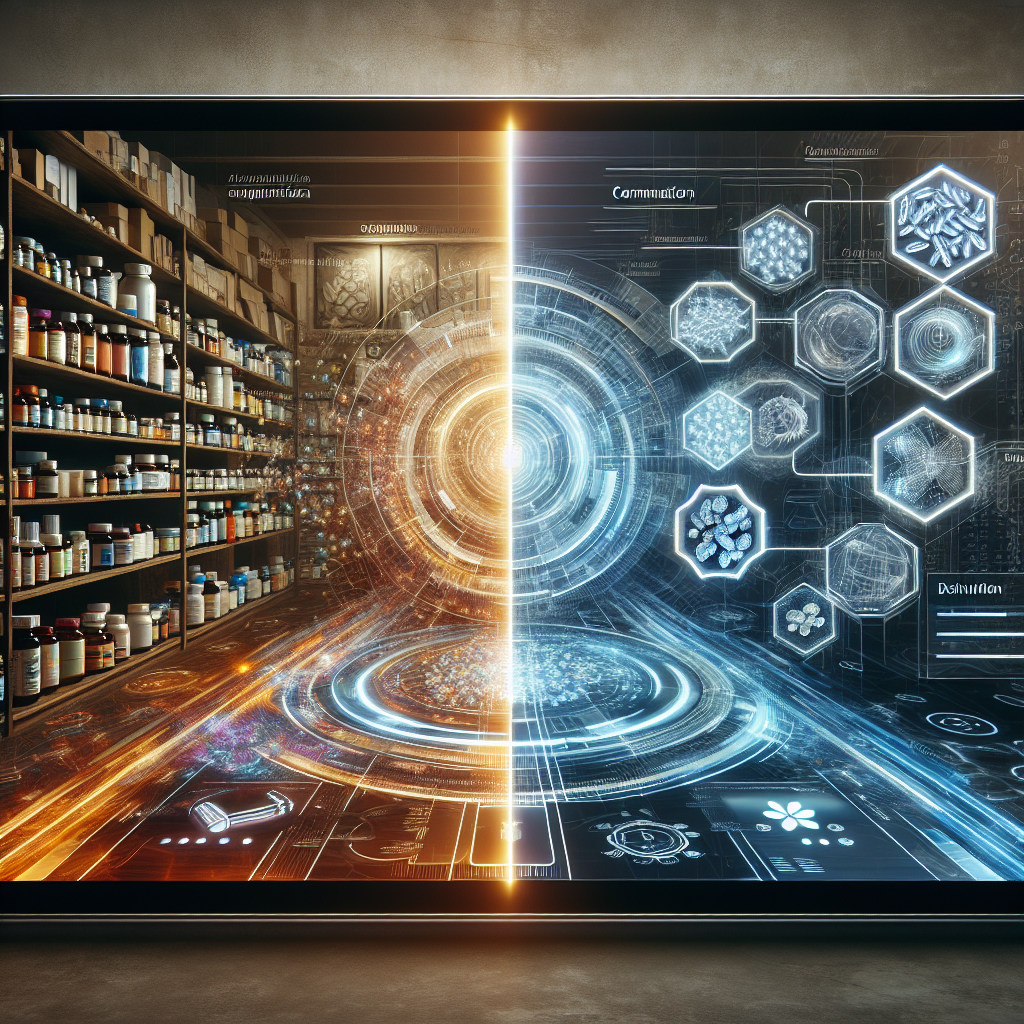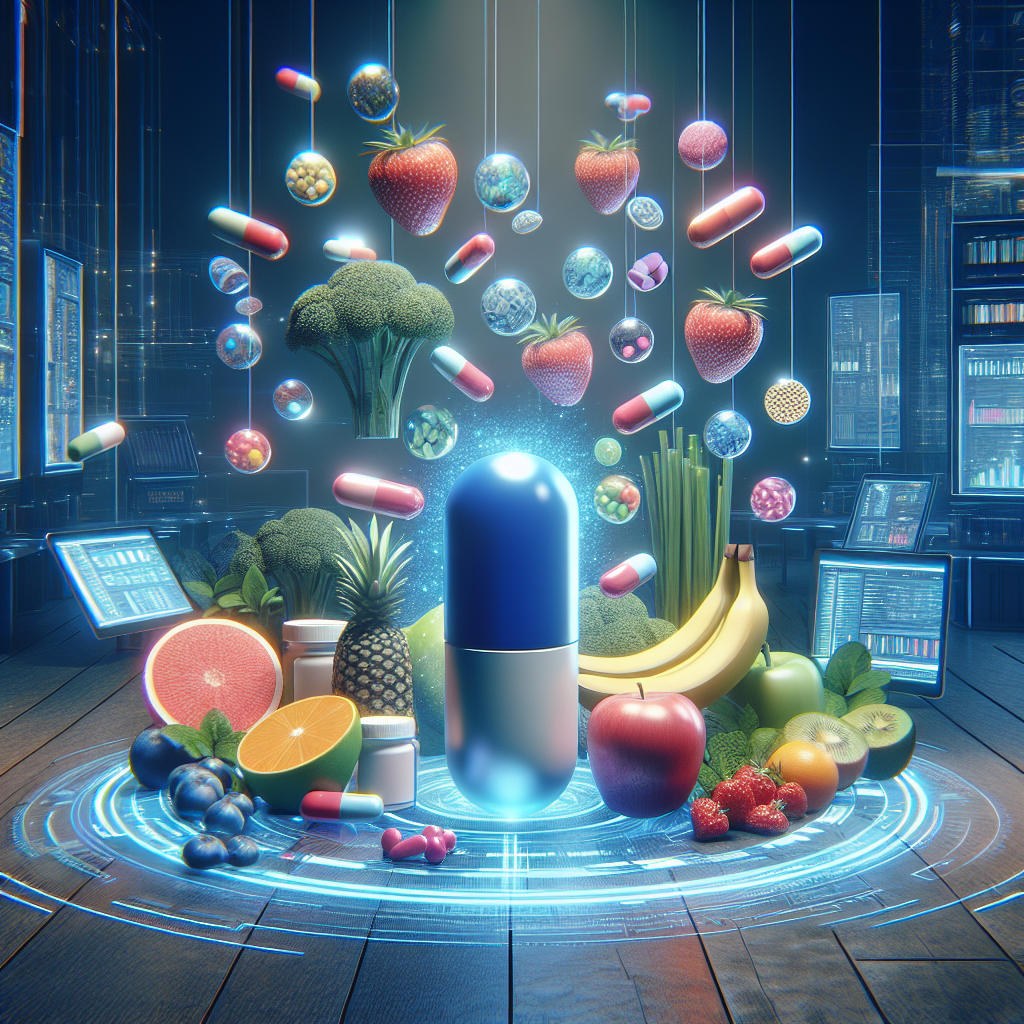The Intersection of Technology and Wellness: Vitamins

Discover how technology and wellness intersect in the world of vitamins. Learn more about this fascinating topic and how it can enhance your health. Click here to explore more.
Exploring the Role of Technology in Enhancing Vitamin Intake
The intersection of technology and wellness is a fascinating and rapidly evolving field, with new developments constantly emerging to enhance our health and wellbeing. One area where this intersection is particularly evident is in the realm of vitamins. Technology is playing an increasingly significant role in enhancing vitamin intake, offering innovative solutions to help us maintain optimal health.
Traditionally, vitamins have been consumed in the form of pills, capsules, or liquids. However, these methods often come with challenges such as difficulty swallowing, forgetfulness, or simply the inconvenience of having to take them at specific times of the day. Technology is now offering solutions to these challenges, making it easier and more convenient for individuals to ensure they are getting the necessary nutrients their bodies need.
One of the most significant technological advancements in this area is the development of smart pill dispensers. These devices not only store and dispense vitamins at pre-set times, but they also come equipped with reminders and alerts to ensure that individuals do not forget to take their vitamins. Some even have the capability to sync with smartphones, allowing users to track their vitamin intake and receive reminders directly on their mobile devices. This not only makes it easier for individuals to remember to take their vitamins, but it also allows them to monitor their intake and adjust as necessary based on their health needs.
In addition to smart pill dispensers, technology has also made strides in the actual formulation and delivery of vitamins. For instance, microencapsulation technology is being used to enhance the absorption of vitamins in the body. This involves encasing vitamins in a protective layer that allows them to pass through the stomach and be absorbed in the intestines, where they can be more effectively utilized by the body. This technology not only improves the efficacy of vitamins but also makes them more palatable, as it can mask unpleasant tastes or odors.
Furthermore, personalized vitamin packs are another technological innovation that is revolutionizing the way we consume vitamins. These packs are customized based on an individual’s specific health needs and lifestyle factors, determined through online questionnaires or even DNA testing. This personalized approach ensures that individuals are getting the exact nutrients they need, in the right amounts, to support their health.
Lastly, the rise of telemedicine has also played a role in enhancing vitamin intake. With the ability to consult with healthcare professionals virtually, individuals can receive personalized advice on their vitamin needs without having to leave their homes. This not only makes it more convenient for individuals to get the guidance they need, but it also allows for more frequent check-ins, which can lead to better adherence to vitamin regimens.
In conclusion, the intersection of technology and wellness in the realm of vitamins is creating exciting opportunities for enhanced health and wellbeing. From smart pill dispensers and microencapsulation technology to personalized vitamin packs and telemedicine, technology is making it easier and more effective for individuals to meet their vitamin needs. As technology continues to advance, we can expect to see even more innovative solutions emerge in this field, further revolutionizing the way we approach our health and wellness.
The Impact of Digital Advancements on Vitamin and Supplement Industry

The intersection of technology and wellness is a fascinating and rapidly evolving landscape, particularly in the realm of vitamins and dietary supplements. The digital revolution has significantly impacted the vitamin and supplement industry, transforming the way products are developed, marketed, and consumed. This intersection has not only revolutionized the industry but also enhanced the overall wellness of individuals globally.
In the past, consumers relied heavily on their healthcare providers for information about vitamins and supplements. However, the advent of the internet and digital technology has democratized access to information. Today, consumers can easily research different vitamins and supplements, their benefits, side effects, and appropriate dosages at the click of a button. This easy access to information has empowered consumers to make informed decisions about their health and wellness.
Moreover, the rise of e-commerce platforms has made vitamins and supplements readily available to consumers worldwide. These platforms offer a wide variety of products, allowing consumers to compare prices, read reviews, and make purchases from the comfort of their homes. This convenience has significantly boosted the growth of the vitamin and supplement industry.
Digital advancements have also led to the development of personalized vitamins and supplements. Using data collected from health and wellness apps, companies can now tailor vitamins and supplements to meet the specific needs of individual consumers. This personalization has not only improved the effectiveness of these products but also increased consumer satisfaction and loyalty.
Furthermore, technology has enabled the creation of innovative delivery methods for vitamins and supplements. From dissolvable strips and chewable gummies to drinkable vitamins, these new delivery methods have made it easier and more enjoyable for consumers to incorporate vitamins and supplements into their daily routines.
In addition, digital technology has facilitated the rise of direct-to-consumer (DTC) brands in the vitamin and supplement industry. These brands leverage social media and other digital marketing strategies to engage with consumers directly, bypassing traditional retail channels. This direct engagement allows DTC brands to build strong relationships with their customers, gather valuable feedback, and quickly adapt to changing consumer needs and preferences.
However, the intersection of technology and wellness is not without its challenges. The abundance of information available online can sometimes lead to misinformation and confusion among consumers. Therefore, it is crucial for companies in the vitamin and supplement industry to provide accurate and reliable information about their products. Additionally, as personalization becomes more prevalent, companies must ensure they handle consumer data responsibly to maintain trust and protect privacy.
In conclusion, the impact of digital advancements on the vitamin and supplement industry is profound. From democratizing access to information and facilitating e-commerce to enabling personalization and innovative delivery methods, technology has revolutionized the industry. As we move forward, it will be interesting to see how this intersection continues to evolve and shape the future of wellness. Despite the challenges, the potential benefits for consumers and the industry as a whole are immense. The intersection of technology and wellness, particularly in the realm of vitamins, is a testament to the power of innovation to enhance our lives.
How Technology is Revolutionizing the Way We Understand and Use Vitamins
The intersection of technology and wellness is a rapidly evolving landscape, with advancements in technology revolutionizing the way we understand and use vitamins. This fusion of health and technology is creating a new era of personalized wellness, where vitamins are no longer a one-size-fits-all solution, but a tailored approach to individual health needs.
In the past, our understanding of vitamins was limited to their basic functions and the consequences of their deficiencies. However, with the advent of technology, we are now able to delve deeper into the complexities of vitamins, their interactions with our bodies, and their role in our overall health. Advanced scientific techniques such as genomics and metabolomics are providing us with a more comprehensive understanding of vitamins. Genomics, the study of our genes, is helping us understand how our genetic makeup influences our body’s response to different vitamins. Metabolomics, on the other hand, is the study of the chemical processes involving metabolites, which are the end products of our metabolism. This field is helping us understand how vitamins are metabolized in our bodies and how they affect our health.
This newfound knowledge is being harnessed to create personalized vitamin regimens. Companies are now offering DNA testing kits that analyze your genetic makeup to determine your body’s specific vitamin needs. This personalized approach ensures that you are getting the right vitamins in the right amounts, eliminating the guesswork and potential harm of taking unnecessary supplements.
Moreover, technology is also revolutionizing the way we consume vitamins. Traditional methods of vitamin intake, such as pills and capsules, are being replaced by more efficient and user-friendly alternatives. For instance, vitamin patches, which deliver vitamins directly into the bloodstream through the skin, are gaining popularity for their convenience and effectiveness. Similarly, vitamin-infused beverages and foods are becoming a popular choice for those who struggle with swallowing pills.
In addition to improving our understanding and consumption of vitamins, technology is also enhancing the way we monitor our vitamin levels. Wearable technology, such as smartwatches and fitness trackers, are now capable of tracking our vitamin levels in real-time. These devices use biosensors to measure the levels of vitamins in our sweat, providing us with immediate feedback on our vitamin status. This real-time monitoring allows us to adjust our vitamin intake as needed, ensuring that we are always at our optimal health.
Furthermore, technology is also facilitating better communication between healthcare providers and patients. Telemedicine platforms are enabling patients to discuss their vitamin needs with healthcare professionals from the comfort of their homes. These platforms also allow healthcare providers to monitor their patients’ vitamin levels remotely, ensuring that they are receiving the right amount of vitamins.
In conclusion, the intersection of technology and wellness is revolutionizing the way we understand and use vitamins. From personalized vitamin regimens to innovative methods of vitamin intake, technology is making vitamins more accessible, efficient, and effective. As we continue to harness the power of technology, we can look forward to a future where vitamins are not just a supplement, but a tailored solution to our individual health needs.